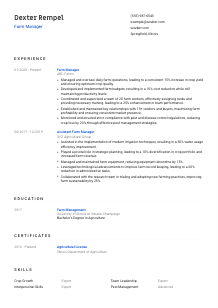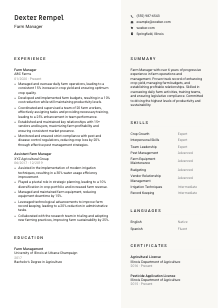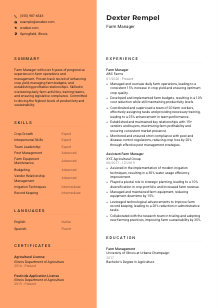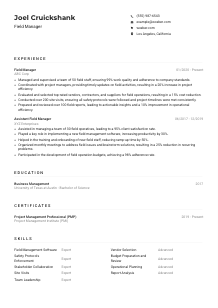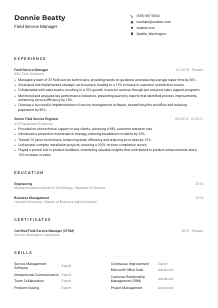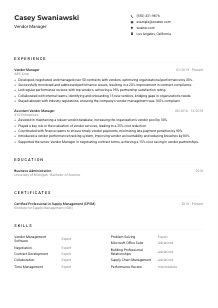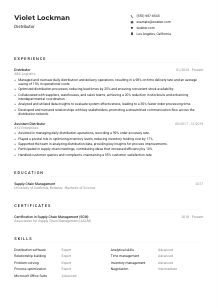Farm Manager Resume Example
Tilling fields, but your resume yields no crop? Harvest inspiration from this Farm Manager resume example, cultivated with Wozber free resume builder. Discover how you can sow your agricultural expertise to meet job requisites, growing your career as bountifully as your harvests!
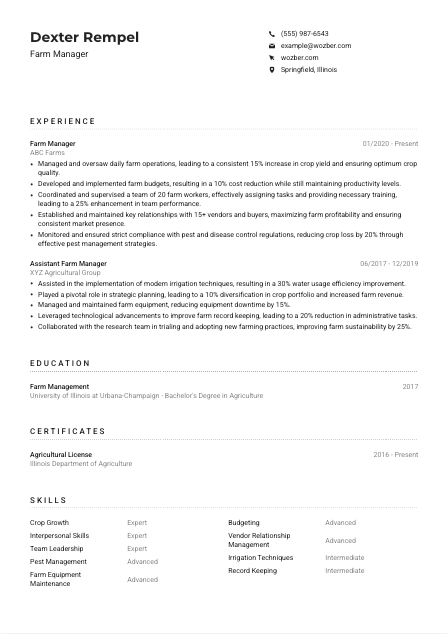
How to write a Farm Manager Resume?
Hello, future Farm Manager! Crafting a resume that speaks volumes about your expertise in farming is your golden ticket to landing your dream job. Using the right tools and strategies, such as a free resume builder and understanding the intricacies of ATS optimization, can set you apart in the competitive field of agriculture management. So, pull up your boots, and let's plow through the process of creating a resume that not only meets but exceeds job expectations.
Personal Details
The Personal Details section is where you plant the first seeds of impression. Let's ensure this section is rooted in relevance and sprouts interest in your profile for the Farm Manager position.
1. Start with Your Name
It's your brand. Make it prominent at the top of your resume, clear and bold. This is the first thing the hiring manager will see, so let it stand out like a well-maintained crop.
2. Job Title Alignment
Just below your name, position the job title you're applying for: 'Farm Manager.' This signals to the hiring manager and the Applicant Tracking System (ATS) that your resume is tailored for this very role.
3. Essential Contact Information
List your phone number and a professional email address. Typos in this section aren't just errors; they're missed opportunities. Double-check for accuracy to ensure you're within reach for an interview call.
4. Pinpoint Your Location
"Springfield, Illinois," as specified in the job requirements, should be your listed location. This matches one of the key requirements straight away, making your resume more relevant.
5. The Web Link
If applicable, include a link to your professional online profile, such as LinkedIn, that mirrors the details of your resume. Ensure it is up-to-date and showcases projects or accomplishments relevant to farming operations.
Takeaway
The Personal Details section is your handshake before the in-depth conversation begins. It sets the tone for your ATS-compliant resume and needs to be both professional and perfectly aligned with the Farm Manager role. Think of it as the gate to your farm, inviting and promising. Keep it neat, precise, and above all, welcoming.





Experience
Your experience section is like the ripest fruit in your orchard - it needs to display your best yield. Structuring this part effectively can demonstrate how your past roles have prepared you for the responsibilities of a Farm Manager.
- Managed and oversaw daily farm operations, leading to a consistent 15% increase in crop yield and ensuring optimum crop quality.
- Developed and implemented farm budgets, resulting in a 10% cost reduction while still maintaining productivity levels.
- Coordinated and supervised a team of 20 farm workers, effectively assigning tasks and providing necessary training, leading to a 25% enhancement in team performance.
- Established and maintained key relationships with 15+ vendors and buyers, maximizing farm profitability and ensuring consistent market presence.
- Monitored and ensured strict compliance with pest and disease control regulations, reducing crop loss by 20% through effective pest management strategies.
- Assisted in the implementation of modern irrigation techniques, resulting in a 30% water usage efficiency improvement.
- Played a pivotal role in strategic planning, leading to a 10% diversification in crop portfolio and increased farm revenue.
- Managed and maintained farm equipment, reducing equipment downtime by 15%.
- Leveraged technological advancements to improve farm record keeping, leading to a 20% reduction in administrative tasks.
- Collaborated with the research team in trialing and adopting new farming practices, improving farm sustainability by 25%.
1. Break Down the Job Requirements
Begin by thoroughly analyzing the job description. Look for keywords related to farm operations, team leadership, and budget management. This guides you on what experiences to highlight.
2. Roles and Companies Structure
Order your experiences from newest to oldest. Each entry should include the job title, the name of the company, and the dates of your employment. This chronological order aids in showing your career development.
3. Craft Targeted Accomplishments
Using the job description as a guide, match your accomplishments to the job requirements. If you "Managed and oversaw daily farm operations, leading to a consistent 15% increase in crop yield," make sure that achievement shines in your resume.
4. Quantify Achievements
Quantifying your results gives a clearer picture of your capabilities. Whether it's the percentage increase in crop yield, the reduction in costs, or the size of the team you managed, numbers make your contributions tangible.
5. Relevance is Key
Your resume isn't a diary entry; it's a highlight reel. Focus on experiences that showcase skills and achievements pertinent to the Farm Manager role. Leave out unrelated accomplishments no matter how tempting it might be to include them.
Takeaway
Your experience section should narrate your professional growth and highlight your successes in farm management. By tailoring each point to reflect the job description and using the Wozber free resume builder for ATS-friendly resume templates, you'll craft a compelling case for why you're the perfect candidate for the job.
Education
Even with hands deeply planted in the soil, a solid educational foundation is vital. Here's how to ensure your education section enriches your resume like a well-composted soil.
1. Key Educational Requirements
Identify the educational prerequisites from the job posting. The job requires a "Bachelor's degree in Agriculture, Farm Management, or related field." Make sure your degree aligns with this criterion.
2. Structure with Simplicity
Keep this section straightforward. List the degree, the field of study, the institution's name, and your graduation date. Clarity in this section ensures that the hiring manager quickly finds the information they need.
3. Match the Job Criteria
If your degree title directly matches the job requirements, feature it prominently. For example, a "Bachelor's Degree in Agriculture" precisely captures what the employer is looking for.
4. Relevant Courses
Though not always necessary, mentioning specific courses can be advantageous, especially if they directly relate to farm management or the cultivation of skills listed in the job description.
5. Other Educational Achievements
Include any extras that might bolster your application, like honors, agricultural clubs, or specific projects. However, gauge their relevance based on the seniority level of the Farm Manager position you're applying for.
Takeaway
Your education section is your chance to solidify your foundational knowledge in agriculture. With the right structure and relevant details, it will lend credence to your capability as a Farm Manager. Remember, every detail in this section is like a nutrient to your resume; choose what enhances its growth towards securing that job.
Certificates
Certificates are the badges of honor in your professional journey, proving your dedication and expertise. How can you display them to effectively communicate your qualifications for the Farm Manager position?
1. Pinpoint Pertinent Requirements
From the job description, identify certificates that resonate with the employer's needs. For instance, "Valid Agricultural or Pesticide Application License" is a clear requirement for this role.
2. Handpick Relevant Certificates
Focus on including certificates that reflect the job's needs. Your "Agricultural License" or "Pesticide Application License" highlights your compliance with state regulations, a key asset for the role.
3. Date Transparency
Include the acquisition or validity dates for your certificates, especially if they have an expiration. This detail assures employers of your up-to-date knowledge and qualifications.
4. Stay Current
In the ever-evolving field of agriculture, continuous learning is vital. Staying updated with the latest certifications not only advances your skill set but also signals your commitment to professional growth.
Takeaway
Certificates are like the premium fertilizer to your resume; they enhance and validate your expertise. Make sure they're visible, up-to-date, and directly applicable to the Farm Manager role you're aspiring for. With the right certificates listed, you're demonstrating not just capability, but dedication and readiness for the job.
Skills
In the vast field of farm management, it's your unique set of skills that can make your resume bloom. Here's how to curate this section to make your talent stand out.
1. Unearth Job Requirements
Scour the job description for both explicit and inferred skills. You're looking for competencies that would enable success in a Farm Manager role, such as "Strong knowledge of crop growth" or "Excellent leadership" abilities.
2. Planting Skill Seeds
Make a list of skills where your expertise directly aligns with those sought by the job description. Your adeptness in "Crop Growth," "Pest Management," and "Team Leadership," for example, are crucial seeds to plant in this section.
3. Pruning for Clarity
Instead of overcrowding this section with a sprawling list of skills, prune it down to the most relevant ones. Each skill listed should serve a purpose and highlight your suitability for the Farm Manager position.
Takeaway
Just like a carefully tended garden, your skills section should be meticulously curated to showcase the most relevant and impressive skills. By aligning this section with the job description using the ATS-friendly resume format from Wozber, you ensure your capabilities are clearly displayed and easily matched to the Farm Manager position.
Languages
The ability to communicate in multiple languages can be a valuable asset, especially in a diverse working environment. How can you highlight your linguistic skills to align with the Farm Manager role?
1. Review Language Prerequisites
Start by identifying if the job specifies language requirements. For instance, fluency in English is a must for the Farm Manager role, so prioritize highlighting your proficiency in English.
2. Showcase Essential Languages
Emphasize your fluency in languages critical to the role. If you're fluent in Spanish as well as English, mention this, as it can be advantageous in regions with a significant Spanish-speaking workforce.
3. Detail Additional Languages
While the primary focus should be on the required languages, don't shy away from listing others you're proficient in. Additional languages showcase your ability to communicate with a broader spectrum of people.
4. Honest Proficiency Levels
Clarify your level of proficiency honestly. Whether you're native, fluent, intermediate, or basic, being transparent about your skills can help avoid misunderstandings and set clear expectations.
5. Role Relevance
In every listing of your language skills, consider how they tie back to the Farm Manager role. For positions involving community engagement or international dealings, your multilingual abilities are more than just a personal asset; they're a professional strength.
Takeaway
Your resume's languages section is an opportunity to showcase your global communication skills. Even if the job doesn't explicitly require multilingual abilities, highlighting them can give you an edge by demonstrating your versatility and readiness for diverse interactions. Remember, each language you speak is a bridge to connect with more people and opportunities.
Summary
The summary is where you set the stage for your resume. It's a concise space to distill your career story, aligning your experiences and skills with the Farm Manager role you're pursuing. Let's make it count.
1. Absorb the Job Essence
Start by fully understanding the Farm Manager job posting. What are the core responsibilities? Which skills are most valued? This comprehension is the seed from which your summary will grow.
2. Ground Your Introduction
Begin your summary with a strong statement that encapsulates your professional identity. For example, 'Experienced Farm Manager with a proven track record in enhancing crop yield and managing efficient farm operations.'
3. Highlight Key Achievements
Briefly mention your most relevant accomplishments that mirror the job requirements, such as improving crop yields, developing farm budgets, or leading a team efficiently. This showcases your direct relevance to the role.
4. Conciseness is Key
The summary should be a snapshot, not a deep dive. Keep it to 3-5 lines that pack a punch, highlighting your farm management competency and readiness for the role.
Takeaway
Think of the summary as the fertile topsoil of your resume, where you set the foundation for everything that follows. By carefully selecting what to highlight, you prime the hiring manager to see you as the ideal candidate for the Farm Manager position. This is your chance to make a strong, succinct first impression, so make every word count.
Launching Your Farm Manager Journey
Congratulations on tending to each section of your resume with care! With this comprehensive guide, you're now equipped to craft a document that speaks directly to the needs of your desired Farm Manager role. Utilize the Wozber free resume builder to ensure your resume has an ATS-friendly resume format, and don't forget to pass it through an ATS resume scanner to optimize for key terms. Your efforts can turn the seeds of your application into a flourishing career.
Now, it's time to harvest the fruits of your labor. Shine bright, and let your qualifications sprawl like a well-managed farm. The field of opportunity awaits!

- Bachelor's degree in Agriculture, Farm Management, or related field.
- Minimum of 5 years' experience in farm operations or management, with progressive increase in responsibilities.
- Strong knowledge of crop growth, pest management, and farm equipment maintenance.
- Excellent leadership and interpersonal skills, with the ability to oversee and motivate a team.
- Valid Agricultural or Pesticide Application License, if required by state regulations.
- Must be fluent in English.
- Must be located in or willing to relocate to Springfield, Illinois.
- Manage and oversee daily farm operations, including planting, harvesting, and irrigation, to ensure optimum crop yield and quality.
- Develop and implement farm budgets, purchase necessary supplies and equipment, and maintain financial records.
- Coordinate and supervise the farm team, assign tasks, and provide training as needed.
- Monitor and manage pest and disease control measures, ensuring compliance with regulations and best practices.
- Establish and maintain relationships with vendors, buyers, and community stakeholders to maximize farm profitability and sustainability.





